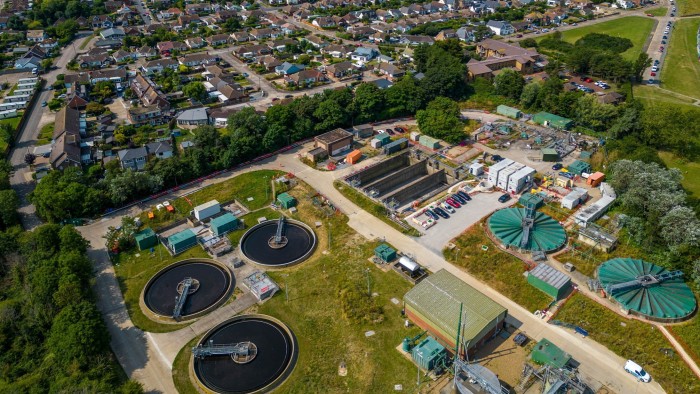Unlock the Editor’s Digest for free
Roula Khalaf, Editor of the FT, selects her favourite stories in this weekly newsletter.
Britain’s water infrastructure will require £290bn of investment to meet government targets over the next 25 years but ministers and sector regulators have no coherent plan for delivery, the public spending watchdog has warned.
The environment department, Ofwat, the Environment Agency and the Drinking Water Inspectorate lacked a “good understanding” of the state of the sewage and water networks and had failed to manage “the rising tide of risk” associated with the sector, the National Audit Office said on Friday.
The regulators’ poor performance would contribute to the 70 per cent increase in household bills by 2030 — the most since 2005-06 — and had left consumer and investor confidence at an all-time low, it added, just as the sector needed investment to secure its financial future.
NAO head Gareth Davies said all four bodies “needed to urgently address industry performance”, which include government targets to cut sewer discharges, reduce leakage and ensure the security of water supplies.
But the watchdog’s highly critical report found Defra, Ofwat and the EA required different plans from every water company and did “not have a good understanding on the condition of infrastructure assets”.
Warning that there was “no coherent national system where integrated decision-making can take place”, the NAO also said no single regulator was taking responsibility for sewage pollution.
A public outcry over outflows into rivers and coastal waters — which hit a record 3.6mn hours in England and Wales last year — triggered a government-commissioned review of the sector.
The report found that the lack of a national strategy for infrastructure improvements — estimated at £290bn by the NAO, based on company data — risked a daily shortfall of 5bn litres of water by 2050, equivalent to more than one-third of the supply now available for public consumption.
Delivering up to 30 water supply projects, including nine reservoirs, in order to boost security of supply will cost an additional £52bn, according to Ofwat.
Water company performance on mains bursts, supply interruptions and pollution incidents had not improved for almost a decade, the NAO said, with the rate of mains replacement so slow that it would take 700 years for the network to be replaced.
The report came two days after the Independent Water Commission, led by former Bank of England deputy governor Sir Jon Cunliffe, closed to submissions.
The official review, which applies to England and Wales, is considering the potential abolition of Ofwat and is due to report this summer.
Ofwat came in for particular criticism in the NAO report over how it decides customer bills and investor returns in exchange for maintenance and infrastructure improvements over five-year periods.
Investors told the public spending watchdog that “complexity makes the process hard to understand”, leading them to “focus their attention on key metrics such as dividends and the return”.
The most recent Ofwat price review — where water companies submit five-year business plans to the financial regulator — comprised more than 60 documents and about 2,000 pages, even before additional changes, the NAO said.
On the day the draft and final rulings on price increases were released last year, Ofwat published roughly 100 documents, it added.
Scoring in one of the regulator’s performance measures, which decide penalties and rewards to companies, was in one case “not transparent and could not be replicated by a third party”, the NAO said.
The NAO warned that 10 out of England and Wales’ 16 water companies were struggling financially and were unable to cover their interest payments with cash from operations.
While that “does not directly mean companies are unable to pay their debts, it does imply that companies are increasingly at risk”, the watchdog said.
Ofwat said it agreed “with the NAO’s recommendations for Ofwat and we continue to progress our work in these areas”.
It added that it was “necessary to attract investment for the improvements needed to ensure that . . . water companies improve their record on pollution”.
The Environment Agency said it would be “working with Defra and other water regulators to implement the report’s recommendations”.
Defra said the government had “taken urgent action to fix the water industry — but change will not happen overnight”.
“The government has secured a record £104bn of private sector investment to upgrade and build new sewage pipes to clean up our waterways for good,” it added.
The Drinking Water Inspectorate did not immediately respond to a request for comment.




